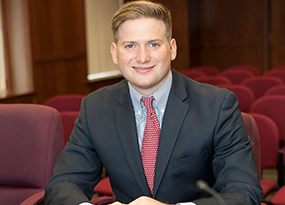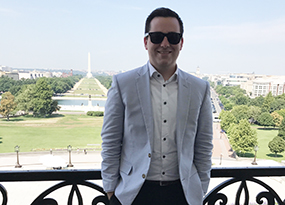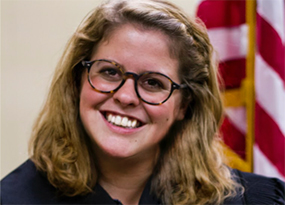30-and-Under Alumni Thrive in Government Careers
Four recent graduates from Manhattan College prove that a staunch commitment to our cities and the nation can yield success in the professional sphere.
Whether your career trajectory includes rising in the political ranks on Capitol Hill in Washington, D.C., or making executive decisions that impact the city or state you live in, a Manhattan College education does more than build a firm knowledge-base. The interdisciplinary and co-curricular programming at Manhattan – together with the institution’s Lasallian heritage – helps politically-minded students develop a perspective that, throughout their professional lives, will allow them to better serve others in whatever capacity they choose to serve and lead.
For the following four Manhattan College alumni, who majored in communication, government, and accounting, Manhattan College was the springboard to launch illustrious careers in government.
-
Michael Whelan '14

At just shy of 26 years old, Michael Whelan ’14 has already begun earning his stripes as a prominent member of New Jersey’s Republican party.
The University alumnus has served for the past two years as Councilman for the borough of Red Bank, for which he has also assumed the roles of police and fire commissioner, council representative on the planning board, and liaison to the Rivercenter business district.
Currently, the former government major is campaigning for a seat on the State assembly, in New Jersey’s 11th Legislative District. If elected in November, Whelan will be helping oversee not only Red Bank, but also Colts Neck, Asbury Park, and 15 other municipalities in Monmouth County.
Whelan’s edge in the state’s political sphere, he says, can be attributed to his viewpoints as a “newer Republican,” who is pro-choice, pro-marriage equality, and opposes the criminalization of marijuana. Moreover, his age also allows him to keep an open mind when it comes to making decisions.
“Because I’m younger, I have the benefit of being able to consider an issue from all sides. I’m not stuck in my ways, or dogmatic. I can step back and look at it from ten thousand feet in the air, and do the right thing for the greatest amount of people,” he says.
During his three-year term as Councilman, which began in January of 2016, the former government major has focused largely on reform, particularly to Red Bank’s downtown. On his watch, a municipal lot on White Street has become a redevelopment zone that will soon be transformed into a parking garage. On nearby Front Street, a 34-unit rental apartment building is in the works.
Whelan’s goal is to make Red Bank more commercially and residentially viable, in order to attract more people. He hopes to absorb members of his own demographic – young professionals – who are instead opting to shop, dine and live in nearby cities like Hoboken and Jersey City.
Whelan got his start in government at Manhattan University during a time when current events were appropriate fodder for his academic major. He took GOVT 306: The United States Presidency with professor Margaret Groarke, Ph.D., during the 2012 presidential election, and the course curriculum was drawn heavily on debate. This encouraged discourse between the students, at a time when they were first developing their own viewpoints on policy.
“[The course] allowed a platform for people to go back and forth and challenge each other, which is the most important thing an educational institution can do for itself and its students. Saying, here’s a topic, look at every angle,” says Whelan, who also remembers a diplomacy course with government professor Peter Heller, Ph.D., as being especially memorable. The summer after he graduated, Whelan hit the ground running with a job at Global Indemnity Insurance Agency, Inc., where he still works as a sales and account executive.
Throughout the summer and into the fall, Whelan will be campaigning hard for his position on the Assembly, but is optimistic on the outcome of the election based on his prior history.
When he ran on the Republican ticket for Councilman of Red Bank, Whelan won in an environment that was largely Democratic for more than 30 years. He ended up clinching the election by only three votes. This time around, Whelan has that experience in his portfolio, and is committed to sticking with the ideals that won him his first election.
“Whatever party you identify with, you’re all facing the same issues, and I’m not going to compromise my principles. I’m concerned with making the right decision,” he says.
-
Ethan Van Ness '13

Ethan Van Ness ’13 can trace his ambition to work on Capitol Hill back to when he was just nine years old, and avidly watching The West Wing. “I declared my government major long before coming to Manhattan University,” jokes the alumnus, who, less than two decades after regularly tuning in to the late ‘90s television drama, is currently serving as a legislative assistant in the U.S. House of Representatives.
Van Ness, who double majored in government and religious studies at the University, is currently stationed in the Washington D.C. office of a certain West Coast Congressman.
Since leaving Riverdale, Van Ness has continued to rise in the political ranks – working his way up from intern and then staff assistant to New York Congressman Eliot L. Engel to Legislative Correspondent and then legislative assistant.
In his current role, Van Ness is primarily a policy adviser to the Congressman, which consists of several duties that largely include oversight of committees and organizations that his camp is involved in.
Specifically, Van Ness’ job entails overseeing policy that relates to poverty, government reform, U.S. military veterans, and healthcare. The Member of Congress he works for is a member of various committees, including the Committee on Oversight and Government Reform, which he manages work for.
Although the University graduate does not consider his political aspirations to be a result of his Manhattan education, he does credit his alma mater for helping him develop the skills to make them a reality. While he was a student, Van Ness held many positions in Student Government, including that of executive vice president, the first-ever vice president of academic affairs, the School of Liberal Arts representative to the Assembly, and Senator. Van Ness was also a member of the educational affairs committee, and a student representative to the Manhattan University Board of Trustees.
Within his major, he participated in Model UN with government professor Pam Chasek, Ph.D., as a head delegate. His involvement in that co-curricular program, as well as his participation in mock debates in the classroom with professor Margaret Groarke, Ph.D., taught him to research and prepare an argument, and think on his feet.
His career achievements thus far are exactly what Van Ness envisioned when he first began dreaming about entering the political jungle in Washington D.C. “This is exactly the field I’ve wanted to be in – in the middle of the fight, working through issues that are affecting the world in a real way,” he says.
In many ways, though, serving the public was a natural rite of passage for Van Ness. His mother is a middle school history teacher, and his grandfather is the former financial director for the city of Meriden, CT.
“I come from a long line of public servants,” says Van Ness. “A lot of people might not see the work we do, but it offers an amazing opportunity to do something good. [Government] is how I’m serving the public.”
-
Melissa Bekisz ’10

When she first visited the School of Business office to declare her academic major, Melissa Bekisz ’10 remembers being so indecisive that she wrote in and crossed out her selection on paper enough times that it became unreadable —prompting an office administrator to insist that she begin a clean worksheet. (Fortunately, majors are now declared electronically.)
She chose accounting first, then marketing, and finally communication, which is the degree she ultimately graduated with from the University. But here’s the twist: Bekisz is now an associate attorney for Brosnan & Hegler, LLP., a Garden City law firm that specializes in estate planning, administration and litigation. And apart from her work at the firm, she is a village justice for Stewart Manor, her hometown on Long Island. While both of these professional gigs might seem a far cry from her liberal arts education, she insists that they are surprisingly connected. They are also both products of her Manhattan University education.
During the spring semester of her junior year, while discussing the figure with a group of faculty that included communication professor Rebecca Kern, Ph.D., Bekisz had an unlikely but clarifying revelation: she was going to become a lawyer. The next day, she signed up for the LSAT, and began studying. “That’s kind of how I am. I make spur of the moment decisions and stick to them,” she says of the experience.
Bekisz had a career plan in mind after that day, so she began to set it in motion. In a Communication Law course she took in the fall of her senior year, her final project focused on the perceptions people develop as a result of watching legal television shows like Law & Order.
After graduation, she went to Saint John’s University School of Law, and landed a job working as a senior associate at Pricewaterhouse Coopers. Before that, she was handling foreclosure litigation for a firm in Rego Park. Her focus now at Brosnan & Hegler is directly in line with her ultimate ambition, which is to work with clients directly. “It’s the field I always wanted to go into when I enrolled in law school,” she says.
Albeit in a different way, Bekisz’s role as a village justice also allows her to resolve issues that affect people’s everyday lives. One Friday evening per month, she appears at a court hearing to decide traffic, parking and housing court violations, as well as other infractions faced by Stewart Manor residents. Beforehand, she meets with the court clerk, who briefs her on the cases she’ll be addressing.
Unlike the decision to declare her academic major, the choice to run for village justice was an easy one for Bekisz. “I always wanted to be involved in local goings-on,” said Bekisz, who lives part-time in town with her mother and grandmother, so she can remain a part of the Stewart Manor community.
But that isn’t her only side gig. For two years, Bekisz has participated in the University’s Mentor Program, which partners current students with professionals employed in the field they plan to pursue. Both that and her appointment in local government are fundamentals of a greater goal. “It’s important to give back to the institution you graduated from, but it’s also important to be engaged in the community you’re currently a part of,” says Bekisz, who tentatively plans to run again for the position at the end of her four-year term, in 2021.
-
Michael Lawler '09
Michael Lawler ’09 landed his first job in politics as an intern working on U.S. Senator John McCain’s presidential campaign.
It was the summer of 2008, just a few months before one of the most influential presidential elections in American history, and Lawler, an accounting major, was splitting his time between the Republican candidate’s New York and New Jersey campaign offices. There, countless hours were spent answering phones, arranging drivers, motorcades and Secret Service detail for McCain’s various trips. As part of his job, Lawler was also tasked with helping to recruit volunteers.
He was connected to the campaign through Michael Sutera, Ph.D., a former adjunct professor at the University who worked full-time at the Federal Reserve Bank of New York, and had a contact working in the McCain camp. The previous semester, Lawler had him as a teacher for a management course that focused on the ways government impacts the business world. Years later, he still remembers that Sutera’s curriculum relied on current events and real-world case studies to educate students, which were significant in helping him develop a point of view, rather than toward a finely outlined career trajectory.
He shared this perspective at Commencement with Manhattan University’s class of 2009, when he addressed his fellow students as that year’s valedictorian.
“‘Instead of saying ‘I went to school for accounting, I’ll be a CPA,’ try to think outside the box. Also, you have to enjoy what you’re doing. If you aren’t, do something else,” he recalls advising in his speech.
So far in his career, this advice has ringed true for Lawler, who has applied the business acumen he began building at the University to various positions he’s held in New York State government.
For instance, while serving as senior adviser to Westchester County Executive Rob Astorino from 2014-16, Lawler was tasked with consulting on matters related to the county’s financials with the budget director, county executive, and deputy county executive.
Prior to that, Lawler was executive director of the New York Republican State Committee. In that position, he also assumed budgetary responsibilities, and assisted in coordinating various efforts with the committee’s political, communications, and finance departments. Further honing his business skills, Lawler also developed and implemented a long-term plan for the state Republican Party that focused on 2014-18.
In the past two years, Lawler has focused his energies on helping lead state Republican candidates to victory. From August until December 2016, he was campaign manager for State Senate candidate Julie Killian, and, most recently, acted as senior advisor to real estate mogul Paul Massey’s run for New York City mayor, a race that the nominee has since pulled out of.
Throughout his career in politics thus far, Lawler has found the interpersonal relationships he’s built in New York to be among its greatest benefits. “I’ve been able to build a network around the state, and friendships. I’ve been able to call on people when I need them. This is what government and politics are about,” he says.
Lawler’s motivation for working in government originated at Manhattan University, and was inspired by its core mission, which reminds all Lasallians to maintain respect for all people, concern for social justice, and value the virtues of a quality education.
“Regardless of your political view, it’s important to have a view, which is why education is the linchpin to everything we want for society. It furthers innovative, new ideas and technology, and in turn creates economic opportunity and upward mobility,” says Lawler, whose future plans do not lie in litigation, but possibly in executive office.
As would be appropriate for a former Manhattan University business student who is committed to helping others, he considers this the best place to work toward finding solutions for the greatest number of people.
“The way my mind works is that when I see a problem, I execute on it,” he says.